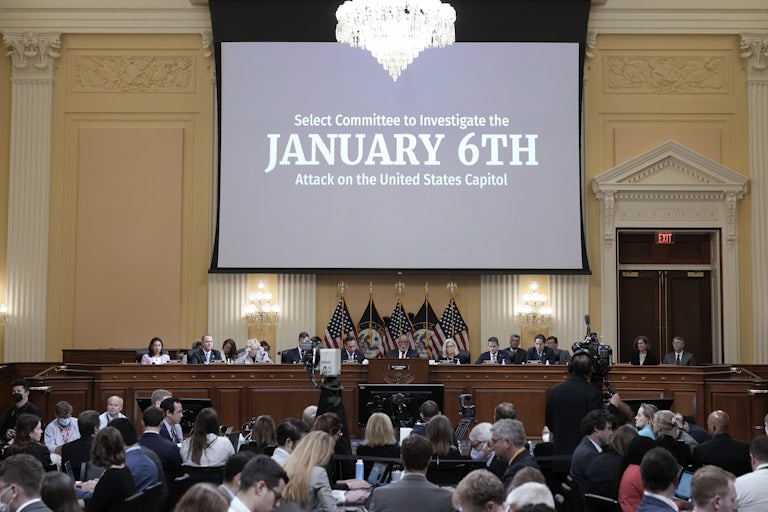The Next Step in the Fight for the Good Life
How Democrats can heed the lessons of 2022 in the year to come

This week, The New Republic will be devoting some of our time to looking back at the villains, ghouls, and do-gooders who shaped the past year in politics. A new Scoundrel of the Year will take their place alongside such luminaries as Mark Zuckerberg and Ron DeSantis, and the entire TNR staff will be making contributions to the cause. In looking back on the work TNR has published in 2022, I keep coming back to one big idea that I’ve tried to nurture on these pages: the necessary fight for the Good Life.
Longtime readers may remember how I tried to elucidate the borrowed-from-Keynes concept of the Good Life as a means of offering a then-wayward Democratic Party a way to get its messaging unstuck. To my mind, the elements of the Good Life boiled down to this: “More shared prosperity to reduce economic inequality; more widely distributed political power so that people have more control over their own lives; more political stability to keep upheaval at bay; and, most important of all, more time with the people we love.”
These are simple ideas that can inform a broad compact with America—one that would recover wealth that was stolen from us and provide a more just and equitable future. Democrats, of course, didn’t end up taking the beating many expected in the midterms, in part because they told a good story about democracy, the fountain from which the Good Life flows. They’ll have an opportunity to keep advancing this vision. Some of my favorite pieces from the past year might help light the way.
Democrats should stop panicking about elections, Walter Shapiro argued: The election “reminds Democrats … that it is time to go back to trusting the American people.” A good place to begin—but there is work to be done. As Joe Lowndes and Daniel Martinez HoSang documented at length, the GOP has made inroads with candidates of color, and Democrats have to take that threat seriously. I’ve urged Democrats to be more proactive, rather than waiting to benefit from GOP wreckage.
But when Republicans do wreck things, it’s good to go on offense. Meredith Shiner’s clarion call for Democratic action after Roe was gutted is a good reminder that time is of the essence in an emergency. One Democrat who spoke the loudest about countering the threats of far-right extremists—and one of the few who seemed to step out in support of the increasingly threatened LGBTQ community—was Michigan’s Mallory McMorrow, who did one of my favorite interviews with our editor, Michael Tomasky.
You can’t have the Good Life without a thriving economy, and while Democrats may not get any of their economic ideas to Joe Biden’s desk in 2023, they need to keep pushing for them, even if ultimately they’re getting voted down by the GOP House (which has its own benefits). One big policy to push: a revived and extended child tax credit, which, as Grace Segers has relentlessly documented, provided massive gains in the war against poverty. The Biden administration has, for the most part, helped to build a labor economy that favors workers and boosts the democratizing influence of unions. The president backed the wrong horse in the recent rail strike fiasco, but Steven Greenhouse provided a blueprint for his administration to get back on the right track.
As TNR editor Michael Tomasky noted, Democrats actually have a pretty good economic tale to tell—but they “need to tell a sharper economic story that identifies enemies of working people’s economic interests by name.” The coming year should be a boom time for shaming the worst of the worst, from the private equity firms sucking the American dream dry to the corporate interests that are keeping ordinary people down, as Sarah Miller wrote so eloquently.
Naturally, the biggest enemy of the Good Life continues to be the GOP and a conservative movement that, as Graham Gallagher illuminated at length, is only getting stranger, more off-putting, and more un-American by the day. We’ve worked hard to chronicle this transformation: from Laura Jedeed and Ana Marie Cox’s on-the-ground coverage of a truly cracked CPAC to Melissa Gira Grant’s constant chronicling of the way the QAnon movement keeps burrowing itself deeper into the halls of power.
Perhaps the most important story that defenders of the Good Life will need to tell over the next year is that Trump’s electoral defeat in 2020 and his weakened profile at the end of this year’s midterm cycle don’t point to the return of a normal, credible, democracy-minded Republican Party. Osita Nwanevu wrote:
The Republican Party understands the climate its rhetoric and strategies have created kills people and will continue to do so; it remains important to Republican politicians that the men being provoked to murder have the right tools at their disposal. It’s of some comfort that many Americans have come to see the right’s degeneracy for what it is and that Republicans continue to pay an electoral penalty for it. But given the mounting structural advantages the GOP enjoys within the federal system, this election barely qualifies as a setback.
We’re not out of the woods yet, but the world only spins forward. On to a new year: a new chance to cut, a new chance to cure.
This article first appeared in Power Mad, a weekly TNR newsletter authored by deputy editor Jason Linkins. Sign up here.








